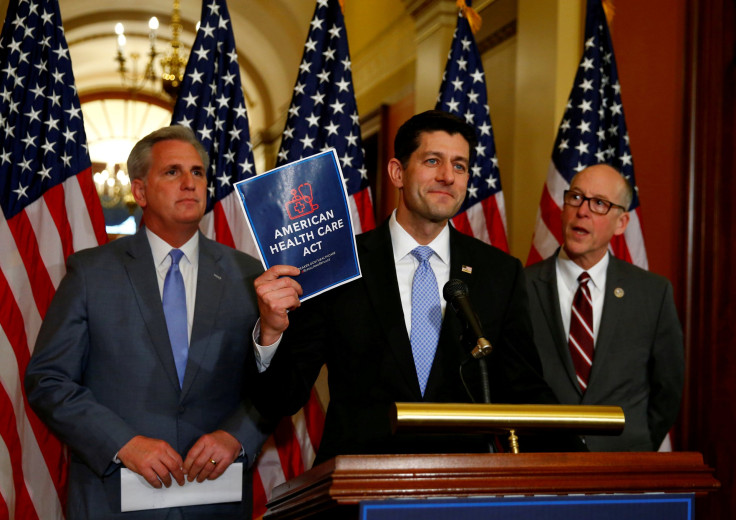Does The New Health Care Law Help Wall Street? Stock Market May Drop If Bill Is Stalled In Congress

As Republicans and Democrats in the House battled over the repeal of former President Barack Obama’s Affordable Care Act Thursday, the 24 million people at risk of becoming uninsured in the next decade weren’t the only ones with reasons to fret over the future of health care reform. Wall Street, too, kept an eye on the debate, as many feared a delay in the American Health Care Act would derail President Donald Trump’s corporate and income tax cuts, which would predominantly benefit the wealthy as well as his deregulatory agenda.
Second GOP lawmaker says a health care vote today is "questionable," says it could be delayed
— Scott Wong (@scottwongDC) March 23, 2017
“Failing to pass the ACA takes away the potential for nearly $1 trillion of tax cuts over the next 10 years and puts the larger agenda in question,” Dan Clifton, head of policy research at the research firm Strategas Research Partners LLC, wrote in a Barron’s column Thursday. He added that for many investors, the AHCA “is first a fiscal policy measure before a health care bill,” as it cuts the unearned income taxes Obamacare used to fund Medicare.
“Getting these tax cuts through buys time for policymakers to get tax reform right. We understand the consensus view that if Republicans cannot get the ACA reform right, how are they ever going to get tax reform? And there is some truth to it,” he said.
Read: Best Apps To Contact Your Representatives Before ACA Repeal Vote
Following the stock market’s worst trading day since October, many investors feared equities might fall further if the bill stalled in the House.
"This is really about the fact that the market is pricing in too much certainty on a number of accounts," Julian Emanuel, the executive director of U.S. equity and derivatives strategy at the investment bank UBS Securities, told Reuters. "Even if you got the positive vote, there's still the residual knowledge that the agenda will be difficult to get through the Senate."
Emanuel made headlines Wednesday when he said on CNBC that he expected a stock market “correction” of 5 to 10 percent as a consequence of Wall Street’s overly-optimistic speculation.
One positive result of the delay, according to Chris Zaccarelli, the chief investment officer of the financial planning firm Cornerstone Financial Partners, would be a slowdown of the Federal Reserve’s gradual interest-rate hikes. The central bank was waiting for signs of high inflation and the sort of rapid economic growth Trump promised on the campaign trail before boosting its policy rate. Increases, like the one Fed Chair Janet Yellen announced March 15, tend to slow down economic activity by pushing up other interest rates, such as those of mortgages and credit card debt, making it more costly for consumers to borrow and spend.
“To the extent that those pro-growth, and most likely inflationary, policies that are expected out of the Trump administration are delayed,” said Zaccarelli, referring to Trump’s promises last year to lower taxes and enact a $1 trillion stimulus package. “There is a belief among many investors that longer term interest rates will stay lower for a longer period of time.”
Read: Trump Slams Obamacare, Urges People To Support His Health Care Plan
© Copyright IBTimes 2025. All rights reserved.






















